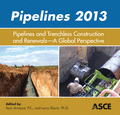Updates - Uniform Soil Groups, Maximum Density of Gravel, Percent Compaction
Publication: Pipelines 2013: Pipelines and Trenchless Construction and Renewals—A Global Perspective
Abstract
A proposal to use uniform soil groups for ASTM, AWWA, and ASCE pipe installation standards, manuals, and documents was first presented at the ASCE Conference "Pipelines 2009." Since then, two ASTM standards and an AWWA specification have been changed to incorporate the proposed soil groups. Currently, work is under way to use the uniform soil groups in three AWWA manuals and one additional ASTM standard. ASTM D 4253 has been the standard for determining the laboratory maximum density for cohesionless soils. The procedure used a vibratory table that involves an expensive and time-consuming calibration process. There is now a new, improved procedure described in ASTM D7382 that replaces the vibratory table with a vibrating hammer. Also known as an impact drill, the tool creates a pulsing, hammering motion while the shaft rotates. The equipment is more durable than the vibrating table and provides more consistent results. The procedure uses a standard sand as a calibration procedure. Instead of the myriad phrases used for describing degree of compaction, the term "percent compaction" should be used as standard terminology. ASTM recommends using percent compaction followed by the standard used to determine the maximum density, e.g. "95% (D 698)." Relative density is the ASTM and soil mechanics term for evaluating the in-place density of cohesionless soils. The procedure is entirely different from using a Proctor type test to judge compaction. Currently, the approach determines the minimum density of the soil as well as the maximum density, and the in-place density is compared to the two. Typically, 70% "relative density" is roughly equivalent to 95 percent Proctor. This provides a source of confusion for contractors who are not familiar with the term and assume the soil does not need much compaction. Adding to the confusion, some agencies use the term "relative compaction" instead of percent Proctor. The use of "percent compaction" for cohesionless soils using only the laboratory maximum density as the control value is useful for pipeline installation work. The same relationship as "percent Proctor" is used except a different laboratory test is used as the maximum value. A new ASTM Manual 70 "Quality Control of Soil Compaction Using ASTM Standards" is now available and presents useful information on the applicability of various ASTM standards for evaluating soil compaction.
Get full access to this article
View all available purchase options and get full access to this chapter.
Information & Authors
Information
Published In
Copyright
© 2013 American Society of Civil Engineers.
History
Published online: Jun 25, 2013
Authors
Metrics & Citations
Metrics
Citations
Download citation
If you have the appropriate software installed, you can download article citation data to the citation manager of your choice. Simply select your manager software from the list below and click Download.
